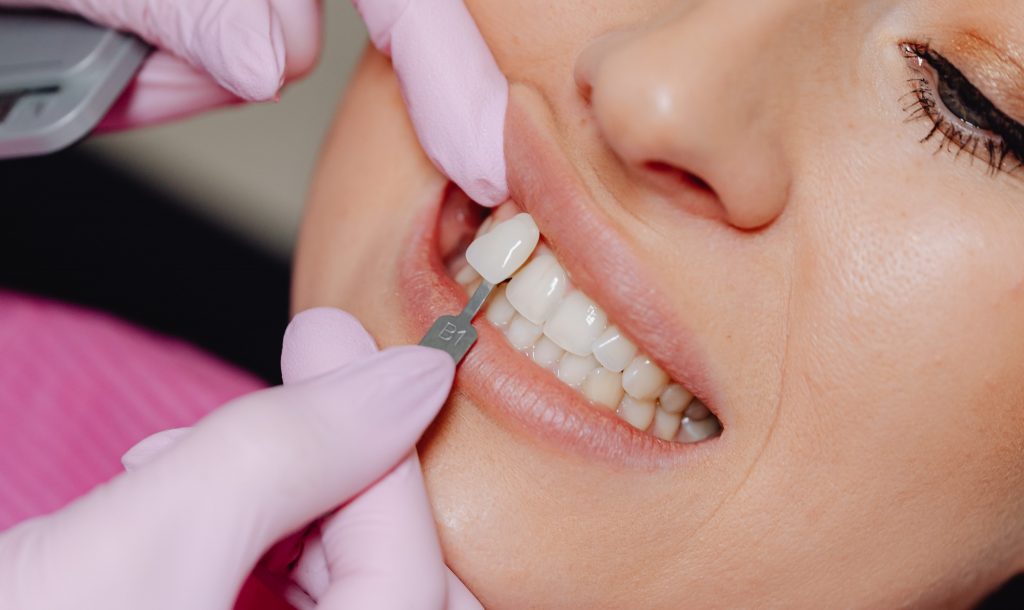Dental crowns are related to a branch of dentistry known as conservative dentistry (operative dentistry plus prosthetic dentistry). It deals with the conservation of natural tooth structure by means of a restoration placed directly or indirectly onto an impaired tooth. One such restoration is a dental crown. It is a non-removable prosthetic appliance that is placed as a protective cap on a root canal-treated tooth. The tooth might previously be damaged by either caries or some trauma that could not be restored via filling.
In addition to providing protection, a dental crown also serves to restore the natural tooth shape morphology, its strength and veils any discoloration if present. In this way it helps to regain the normal tooth function and appearance. It covers the tooth completely above the gum line. It is fabricated in the dental laboratories and then delivered to the dentist so as to be inserted into the patient’s mouth.
Why is a crown needed?
You may need a dental crown for a variety of reasons. They are:
- To cover a root canal treated tooth
- To cover a severely decayed tooth
- To cover traumatized fractured tooth
- To cover a worn down tooth
- To cover a tooth with a dental implant
- To cover an extremely discolored tooth
- For holding a dental bridge
Is it worth getting a crown?
The worth of getting a crown can be understood from the fact that it conserves the tooth and prevent it from getting removed. Getting a tooth removed (extracted) is actually a more involved surgical procedure that results in loss of your tooth. Contrary, a dental crown is an outstanding way out for various tooth issues and provides you with acceptable, long running results.
What materials are crowns made up of?
Crowns are made up of material that includes:
- Metal crown- it has the highest wear resistance, least susceptible for breakage and capable of bearing biting stresses. Its metallic color is the only disadvantage and so it is suitable for molar teeth.
- Porcelain fused to metal (PFM) crown- it is aesthetically pleasing with little chances of breakage. It can acceptable for both anterior (front) as well as posterior (back) teeth.
- All resin crown- it’s relatively cheaper and cannot be used for posterior teeth as it lacks strength.
- All porcelain (ceramic) crown- used when the patient is allergic to metal. It cannot bear enough stresses and so is suitable for front teeth.
- Pressed ceramic crown- used where aesthetics is the main concern as it provides best color match
Problems that can occur with crowns
- Chipping of crown- needs to be replaced if the chip is large and can be fixed if it is small.
- Sensitivity- experienced soon after getting a tooth crowned but it goes in some time. If it persists, start using toothpastes for sensitive teeth. If it doesn’t go or you feel pain on biting, it means there is a high spot on the crown that is easily removed once you visit your dentist.
- Loosening of crown- happens when the cement that holds your crown in place washes away. At this point, you should visit your dentist.
- Dark line on the crown- this is the case with PFM crowns. It’s the metal that is displaying and nothing to worry.
How much does a dental crown cost?
Cost of a crown depends upon various factors which are:
- Material used for crown fabrication
- Concerns of the patient
- Technique used for crowning
- Clinic location
- Number of appointments planned
The price generally ranges from $1500 to $3000 for dental crowns, but it can vary depending on the situation.
Why is a crown better than filling?
- Crowns can cover the entire tooth structure and is applicable for decayed, broken down and fractured tooth. Whereas, filling is the solution for moderately decayed tooth only
- Crowns are fabricated to look more natural whereas, fillings except composite don’t provide a natural look.
- Crowns lasts for about 5 – 15 years whereas, fillings last for only 5 years or more
How long do dental crowns last?
The life of a crown varies from 5 years to 15 years, but it also can last even longer than that period. It largely depends on the aftercare instructions followed by the patients and the amount of attrition it has been exposed to.
There is no special care to be taken after getting a crown inserted. Brushing frequency, proper brushing methods and using fluoride toothpastes are some of the things that are important. Apart from hygiene, patients shouldn’t be indulged in the following habits to prevent porcelain fracture:
- Nail biting
- Excessive grinding of teeth
- Biting on hard objects or food stuff
- Using your teeth to open plastic packages, bottles, envelopes etc
Woden Dental Centre offers a variety of restorative options in Canberra to help you achieve that perfect smile.
If you need a visit to the dentist, to get any dental procedure done conveniently, place an appointment here and get your timings fixed.













